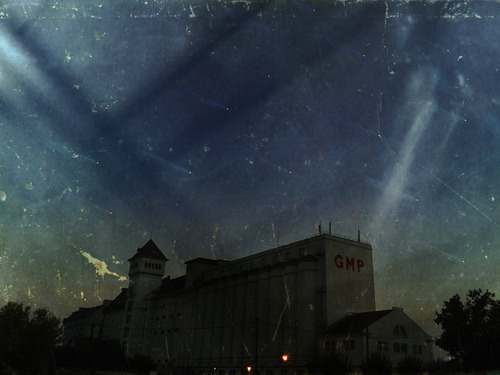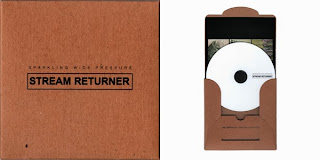Colorado artist
Cody Yantis has been developing a distinctive sort of primarily guitar-based composition over the past few years. His 2011 debut LP,
Kerning (
Blackest Rainbow), showed him exploring a more drone-centered take on Loren Connors-style guitar meditations, fleshing out his sound with subtle piano, banjo, and field recording embellishments. Since then, Yantis has gone on to release a string of solo cassettes that have featured blistering ambient noise (
Box Elder, Cold Scholar), barebones electric guitar investigations (
Strung Figments), and Arvo Pärt-like minimalist heft (
American Surfaces). He has both extended and refined his sound further through recent collaborative outings as
Saguache, his duo with
Seth Chrisman, and as
Tilth, his duo-cum-trio with
Nathan McLaughlin and
Joe Houpert. Central to all of Yantis’ work, though, is a sense of both place and space, what he describes as, “an idea of landscape as sound.”
Over the past few months, Yantis has added two more releases to his ever-evolving discography:
Place & Distance, a CD-R out on
Analogpath, and
Starvation Winter, a tape out on
Sunshine Ltd. Both show Yantis continuing to push himself in new directions, working with organic and acoustic sounds to drastically different effects, while mapping his immediate surroundings for interpretation. “The title
Place & Distance refers rather directly to my life in rural Southwestern Colorado at the time of recording,” he explains. “I’m an
extremely place-oriented person, so the high desert mountain environment played a crucial role in the types of sounds I wanted to create (brittle, open, organic) as did my relative isolation — my nearest community of friends/family was a five-hour drive away. I was negotiating all of this during the recording process. Hence, the
Placeand the
Distance of the title.”
 Place & Distance
Place & Distance is perhaps Yantis’ most instrumentally varied and sonically rich work to date with more noticeable layers of saxophone, bowed strings, and unidentifiable crackling textures. In places, it bears some similarities to
Ashley Paul’s organic and free-flowing approach to songcraft, sans vocals. “I wanted to really push myself on this project and try to find new ways of exploring sound, though I had no concept of how this would actually play out. I put far more restrictions into place at the outset, which I think is probably the biggest reason for the shift,” says Yantis.
Analogpath’s focus on presenting works from artists dealing in analog sound also shaped how Yantis approached this album. “Since I record digitally, I was initially unsure if I fit their criteria, but through my conversations with Tetsuo, who runs the label, we settled on the idea that I would make an ‘acoustic’ album,” explains Yantis. “I then decided to further restrain myself to non-’traditional’ uses of acoustic instruments (e.g. no acoustic guitar chords or melodic lines), in hopes that I’d find myself venturing into new territories, which I feel that I ultimately did. So, all of the sound sources are acoustic, with the occasional embellishment via amplification and/or digital effects pedals.”
 Starvation Winter
Starvation Winter, Yantis’ most recent release, also chronicles a specific time and place: “…an audio transcript of his time spent holed up in a snow blown house in Colorado during the winter of 2012,” as the label description reads. While
Starvation Winter has a decidedly forlorn quality to it, which anyone who has endured harsh winter conditions would understand, it maybe falls closer in line with the sounds that he explored with Nathan McLaughlin on Tilth’s debut,
Angular Music. This is most likely due to the additional tape loop accompaniment that
Josh Mason provided, adding layers of wobbly and dream-like textures to Yantis’ otherwise clean acoustic and frazzled electric guitar lines. “As bleak as
Starvation Winter is at times, it was a joy to make,” says Yantis. “Josh Mason was insistent that if I focused on clear, minimal guitar lines, a moving and worthwhile project would arise, and it did. I can’t overstate how central of a role Josh played in the project. He took a guitar line or two of mine, ran them through tape, and arranged everything into a beautiful and engrossing sonic landscape.”
Place & Distance and
Starvation Winter contain drastically different sounds and approaches, which is something Yantis recognizes in his own work. “I feel I almost have two sides to my musical output. One is a sustained study of the guitar, the other is a dogged desire to push myself farther into unexplored territories (for me, at least).” Despite these differences, Yantis’ use of negative or open space as a compositional tool remains a constant in all of his work, forging a sound that is uniquely his own. As
Brad Rose of
Digitalis highlighted in the write-up for the
American Surfaces release, “Whenever I hear anything he’s done, it is instantly recognizable.” Yantis goes on to say that, “ …space and openness are central to how I process and work with sound. Silence puts sound in stark relief, more clearly highlighting sonic qualities and textures. Incorporating space into a piece of music also heavily dictates pacing, which is a crucial aspect of my music. I’m a kind of minimalist at heart (both in my art and my life), so I often spend a good deal of time paring down my recordings in hopes of arriving at a piece that contains exactly and only what is necessary.”
Yantis’ approach to composition has also been a response to the artists that have had a profound impact on him. He cites a wide range of artists from composers (Morton Feldman, John Luther Adams, and Bill Dixon), to photographers (Stephen Shore and Robert Adams), to filmmakers (Béla Tarr and Apichatpong Weerasethakul), and to authors (John Haines, James Galvin, and Richard Hugo) as influences. Yantis asserts, “I am drawn to, and have great respect for, artists who lay it all out in the open. Utilizing space in one way or another is key to achieving this, I feel.” His latest works show him following suit, laying it all out in the open to powerful affect.













 Place & Distance is perhaps Yantis’ most instrumentally varied and sonically rich work to date with more noticeable layers of saxophone, bowed strings, and unidentifiable crackling textures. In places, it bears some similarities to
Place & Distance is perhaps Yantis’ most instrumentally varied and sonically rich work to date with more noticeable layers of saxophone, bowed strings, and unidentifiable crackling textures. In places, it bears some similarities to Starvation Winter, Yantis’ most recent release, also chronicles a specific time and place: “…an audio transcript of his time spent holed up in a snow blown house in Colorado during the winter of 2012,” as the label description reads. While Starvation Winter has a decidedly forlorn quality to it, which anyone who has endured harsh winter conditions would understand, it maybe falls closer in line with the sounds that he explored with Nathan McLaughlin on Tilth’s debut,Angular Music. This is most likely due to the additional tape loop accompaniment that
Starvation Winter, Yantis’ most recent release, also chronicles a specific time and place: “…an audio transcript of his time spent holed up in a snow blown house in Colorado during the winter of 2012,” as the label description reads. While Starvation Winter has a decidedly forlorn quality to it, which anyone who has endured harsh winter conditions would understand, it maybe falls closer in line with the sounds that he explored with Nathan McLaughlin on Tilth’s debut,Angular Music. This is most likely due to the additional tape loop accompaniment that